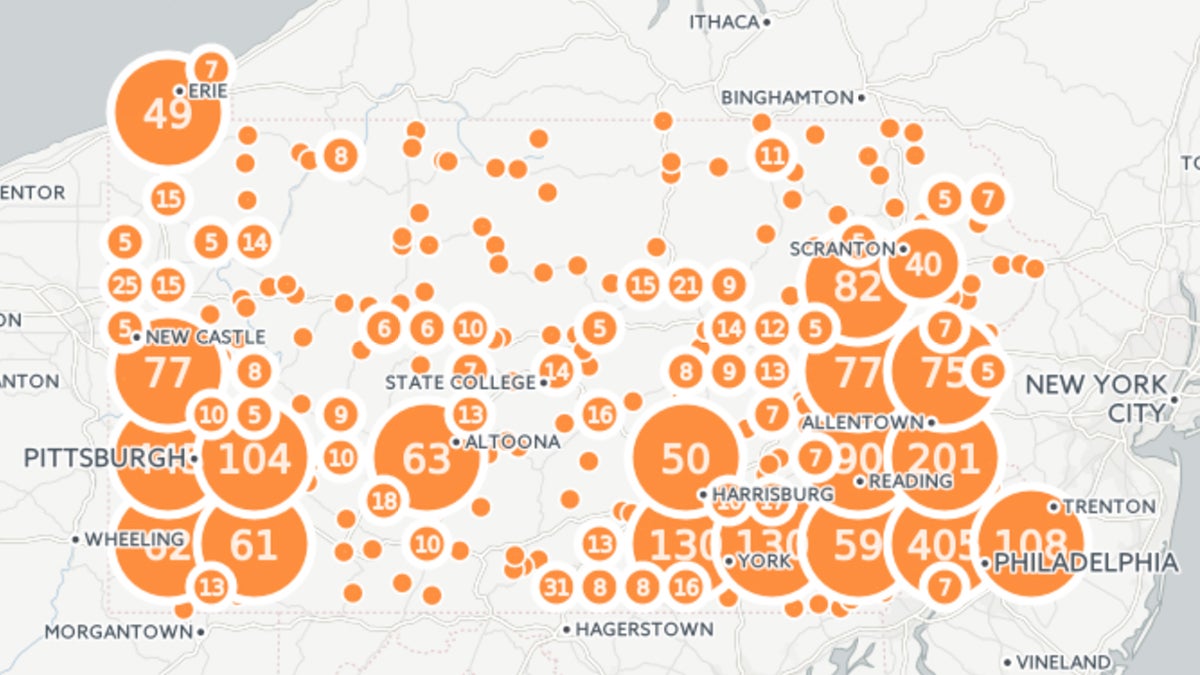Map: Tracking growth of new businesses in Pennsylvania

The map shows the distribution of new and expanded businesses in Pennsylvania. Zoom in to see what the distribution looks like in your town. Data from Conway Inc.’s New Plant Database. Map created by Irina Zhorov/Keystone Crossroads.
New companies are choosing Pa.’s urban areas. Manufacturing companies continued to come to the state despite overall job losses in the sector.
The map shows the distribution of new and expanded businesses in Pennsylvania. Zoom in to see what the distribution looks like in your town. Data from Conway Inc.’s New Plant Database. Map by Irina Zhorov/Keystone Crossroads.
Keystone Crossroads used Conway Inc.’s New Plant Database to explore what kinds of companies have opened throughout Pennsylvania in the past ten years. Conway primarily tracks large projects which meet one of the following criteria: 50 or more employees, 20,000 or more square feet of space (that’s a footprint of about a half acre, or about half the size of a typical, full-size grocery store), or $1 million or more in investment to open or expand the business. According to Conway, the database is primarily used by “economic development, corporate and marketing executives who want quality verifiable leads, information on industry trends and competitive data,” but we thought it would be interesting to visualize what large-scale development looks like in the Commonwealth.
Just over 3,000 total businesses fitting Conway Inc.’s criteria opened or expanded in the past decade. Of those, a little over half (1,665) were new and the rest (1,371) were expansions.
The map shows, perhaps unsurprisingly, that large, new businesses are concentrated around the most urban parts of the state. The availability of quality labor and ease of logistics, like transportation, are some of the most important factors companies look for when choosing where to settle. The largest cities, Philadelphia and Pittsburgh, are also attracting the most diverse set of industries. The action is regional, in exurban and suburban rings around the cities, and in the cities proper.
Growth outside the urban core is not new; a 2010 Brookings Institute report found that the Philadelphia and Pittsburgh metro areas were among those with by far the highest share of jobs 3-35 miles from the central business district: 85 percent of jobs in Philadelphia and 75 percent of jobs in Pittsburgh.
But there’s some evidence that the dense clusters of points on the map within the cities are part of a recent national trend where companies are choosing to grow in urban centers. A study by City Observatory shows that from 2007 to 2011 in the Philadelphia core jobs grew 2 percent, versus -0.1 percent in the periphery, and in Pittsburgh it grew 1 percent in the core and 0.1 percent in the periphery. The study says “the strength of city centers appears to be driven by a combination of the growing attractiveness of urban living, and the relatively stronger performance of urban-centered industries (business and professional services, software) relative to decentralized industries (construction, manufacturing).” At least in Conway’s data, manufacturing is strong in the cities, as well.
According to Conway’s data, manufacturing companies in the state — this broad category includes everything from steel making to food production — by far contributed the most new projects, 1,719. Companies sprang up in and around Philadelphia and Pittsburgh, but also around smaller cities like Erie, Altoona, Harrisburg and along the highways between towns, presumably in industrial parks.
What the map doesn’t show is that from 2004 to 2014 the state actually lost more than 100,000 manufacturing jobs, about 18 percent of the sector’s total. So while the state continues to attract manufacturing companies, the sector as a whole is shrinking. It’s been contracting since at least 1997, and the most recent recession didn’t help.
The Mining, Quarrying, and Oil and Gas Extraction sector saw 171 large new or expanded companies in the state. Those companies primarily popped up in the southwestern and northeastern parts of Pennsylvania, which corresponds with Marcellus Shale development. Direct employment in the natural gas boom has grown from about 10,000 to more than 33,000 from 2007 to 2014, and even more jobs indirectly related, according to the Pennsylvania Department of Labor and Industry.
Finance and Insurance companies, with a few exceptions, settled around Philadelphia, Pittsburgh, and Harrisburg; while Harrisburg is not one of the largest cities in the state, its status as a political center attracts certain kind of businesses.
Information companies were most dense in Philadelphia, Pittsburgh, Allentown and around Scranton.
Professional, Scientific and Technical Service companies concentrated in Philadelphia, Pittsburgh, Harrisburg, as well as Allentown and Lancaster.
Wholesale Trade establishments are also concentrated around Philadelphia, Harrisburg, Pittsburgh, Allentown, and Wilkes-Barre-Scranton.
Transportation and Warehousing cropped up primarily in the eastern part of the state, as well as in and around Pittsburgh.
Conway Inc.’s New Plant Database is not comprehensive; the database may be missing companies that fit Conway’s criteria but that Conway didn’t catch in their data gathering.
WHYY is your source for fact-based, in-depth journalism and information. As a nonprofit organization, we rely on financial support from readers like you. Please give today.


